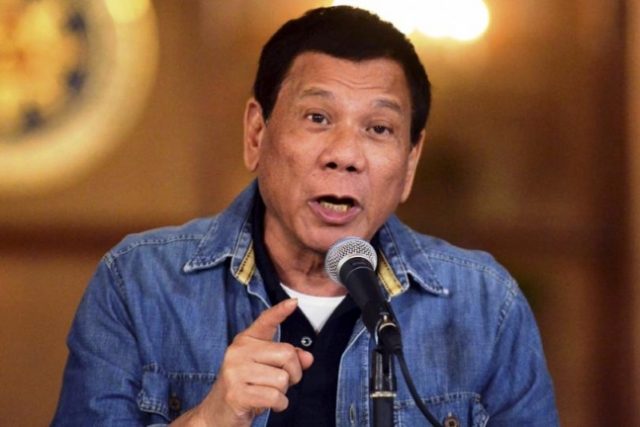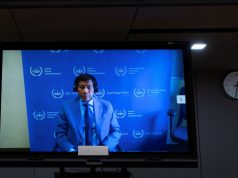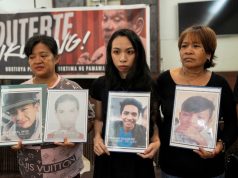Atty. Mel Sta. Maria is the Dean of the Far Eastern University Institute of Law and Professor at the Ateneo de Manila School of Law.
“SOLIPSISTIC”. This was the characterization of US President Donald Trump’s behavior by well-renowned psychiatrist Dr. Robert Jay Lifton in his interview with journalist Amy Goodman in her program “Democracy Now”. Goodman asked, “what do you mean solipsistic?”
Lifton replied:
“Solipsistic – from within the self. In other words, he only sees the world from within his sense of self. He can’t have empathy for others. He can’t really think into the future the consequences of his actions, because he’s totally preoccupied with the immediate event and how he can deal with it or manipulate it as emerging through the perception on the part of his sense of self.”
Dr. Lifton also noted “his difficulty with crisis and his extreme behavior and attack mode instead of any kind of balance – any kind of balance that a president needs to deal with a crisis.” He further said that being solipsistic was President Trump’s “relation to reality” and that it was “untenable and dangerous to everyone.”
How about President Rodrigo Duterte, is he also solipsistic?
President Duterte is definitely neither insane nor crazy. But a number of his actuations rouse many to question whether or not he is befitting of a Chief Executive, Commander-in-Chief, and Chief Architect of our Foreign Policy.
The “new normal” seems to be his usual “attack mode” of blustering and ranting against those disagreeing with him or, simply, not of his liking. On his war on drugs which is perceived to have resulted to thousands of extrajudicial killings, he addressed the drug pushers: “I will kill you” – a declaration which is outright discordant with the rule of law. Referring to 3,000,000 drug addicts, he openly stated “I’d be happy to slaughter them”. He even threatened to include human rights advocates by warning “I will include you because you are the reason why their numbers swell.” Are these statements a kind of “extreme behavior” borrowing the words Dr. Lifton?
And commenting on former United Nations Secretary General Bank Ki-moon’s observations on the Philippine human rights situation, President Duterte in September 2016 said: “Pati ito si Ban Ki-moon, nakihalo … Sabi ko, isa ka pang tarantado.”
“F**k You” with an obscene middle finger gesture was also President Duterte’s immediate message to the European Union (EU) when it commented on the extrajudicial killings in the Philippines. Instead of taking it as constructive criticism aimed at maintaining the no-tariff privilege of about 6,300 Philippine products exported into the EU, President Duterte responded with patent antagonism.
We also witnessed President Duterte’s attacks against Chief Justice Maria Lourdes Sereno and Ombudsperson Conchita Carpio-Morales. Apparently, this was provoked respectively by the Chief Justice’s generic message (without explicitly referring to President Duterte) to Ateneo graduating students to be always vigilant against government abuses and by Ombudsperson Morales’ openness to his investigation. Challenging them to reveal their accounts and to resign, President Duterte warned of the extreme alternative of military intervention by saying: “Who will decide? The Armed Forces and the police will decide it for us so that the nation would not plunge into chaos”.
Again, this is not the kind of response expected of a head of state sworn to uphold the constitution enunciating that the civilian authority is superior over the military. The military temporarily takes over only when there is actual invasion or rebellion seriously endangering public security. Is President Duterte erroneously treating his own personal bias as equal to that of the public interest, thus making him believe that criticisms against him are automatically against the common good? Is the President confusing his own personal situation with the condition of the country?
The speech during the installation of the Davao officers of the Integrated Bar of the Philippines was just replete with expletives. Responding to the comment of being “onion-skinned”, President Duterte irascibly said:
“And you just say ‘do not be onion-skinned.’ Who the fuck are you to tell me, in face of fabricated evidence. Sinabi ko na sa before the election wala ako niyan, at wala ako ngayon… Ihampas ko sa mukha mo yang putanginang papel na yan,”
With respect to the striking jeepney drivers, President Duterte blustered: “I am the president. Either you kill me or you follow me. If the law is not followed, son of a bitch, we have to kill each other”. He continued:
“Mahirap kayo? Putangina. Magtiis kayo sa hirap at gutom, wala akong pakialam. It’s the majority of Filipinos. Huwag ninyong ipasubo ang tao.”
These attack-mode statements are condescending and, to others, insensitive. Certainly, there must be other ways to communicate a message. Even if the jeepney drivers are not the majority, is it not the essence of good governance that the minority must also be heard and protected? Is he “seeing the world from within his sense of self” such that “he can’t have empathy for others” just like Dr. Robert Jay Lifton’s description of President Trump’s behavior?
Where is the balance in his responses? From what we are witnessing so far, is President Duterte unraveling?
Unbalanced reactions lead to irrational judgments. And though the person making them may egotistically satisfy himself/herself, he/she may bring senseless hardships to others. For instance, many believe that President Duterte’s retaliation against the European Union in May 2017 ending the Philippine’s funding agreement with the EU was an inexplicable mistake. This unexpected move even surprised the EU representatives here. The Philippine Star reported on May 19, 2017 that this meant “the loss of about 250 million Euros or 278.73 million worth of grants.” One could just imagine the various projects – beneficial to many people – derailed for lack of funds.
Recently, President Duterte again lambasted the EU saying “Don’t f**k with us” and added a disconcerting declaration apparently showing that “he can’t really think into the future consequences of his actions” (using the words of Dr. Lifton). He impetuously said:
“You think we are a bunch of morons here. You are the one. Now the ambassadors of those countries listening now, tell me, because we can have the diplomatic channel cut tomorrow. You leave my country in 24 hours, all, all of you.”
Even if this remark were a knee-jerk reaction, it is disturbing. Had the threat materialized, it would have severed diplomatic relations with twenty-eight (28) European countries from where more or less US$901 million dollars in export-income are earned. These are also the places where thousands of OFWs are working hard to provide a living for their families in the Philippines. In one-fell-swoop, all the efforts exerted throughout the years in developing, nurturing and sustaining friendly and productive relations would have been rendered for naught.
Defending President Duterte against his detractors who commented that the president was “paranoid” in suggesting the establishment of a “revolutionary government”, Secretary Martin Andanar said “that’s their opinion and we don’t share it. We have been working closely with the President and we can assure you that his mind is sound.”
The need for Secretary Andanar to respond only proves that the issues are joined. Whether or not President Duterte’s “mind is sound”, as Andanar puts it, is an unavoidable part of all political discourse or debate examining the President’s capability or incapability to meaningfully lead the country. The discussions may be sharp and tasteless at times but they are necessary. Citizens have to talk about it in a vibrant and robust democracy.
It is a matter of national interest, especially considering the readiness of his allies and/or followers – in his own cabinet, the House of Representatives, the Senate and the Supreme Court – to champion not only his every decision and bias, but also his whim and caprice – a sure recipe for a conniving autocracy.
To be effective as the head of state, President Duterte must demonstrate a sense of balance, composure and objectivity focusing not on how quickly he can attack his critics but on how well he can build on criticisms for the betterment of all, including those who do not agree with him.










